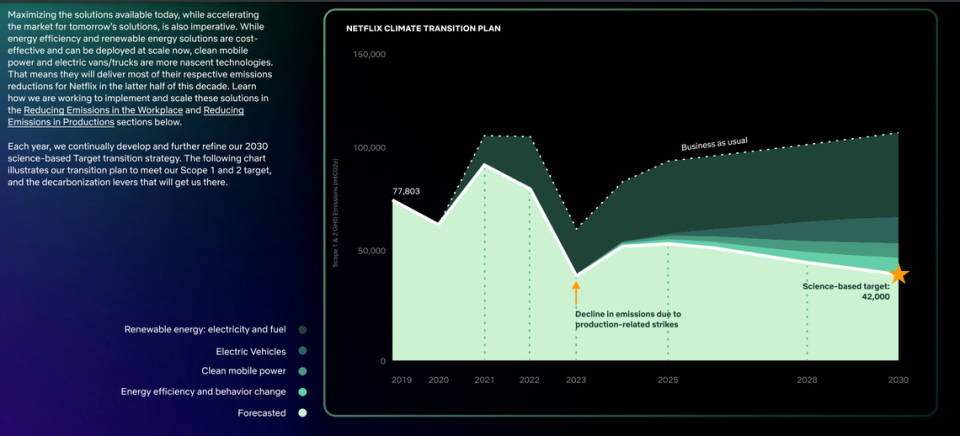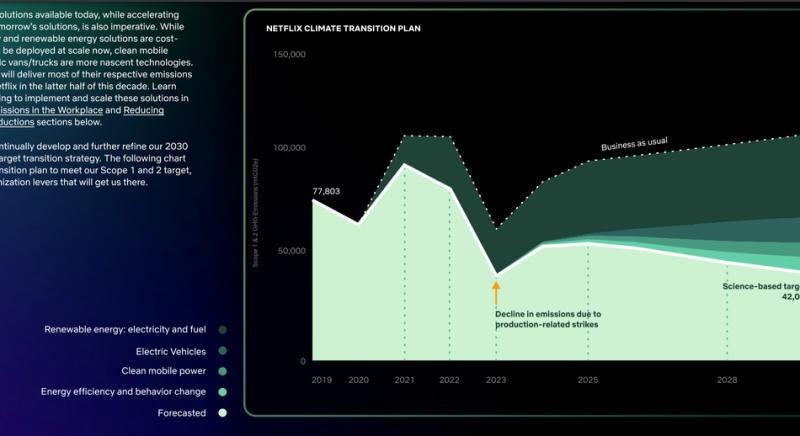Netflix kept the environment in mind while filming the final season of “Stranger Things” in Georgia
The weather promise that Netflix made in 2021 is coming true in “Stranger Things” this year in Georgia.
The fifth and final season of Netflix’s most-watched original series is about using solar batteries, solar trailers, diesel-free generators and electric cars to reduce the company’s production, all without compromising the film or production quality.
“Netflix aims to cut emissions in half by 2030 to 2019 levels,” Shannon Bart, senior director of operations and products at Netflix, said during an interview at the Climate Film Fest in New York in September. Bart said more than half of the company’s revenues come from television and film production.
Of the emissions, 70% come from cars and 30% from diesel generators.
Since season five filming in and around Atlanta began in January, the movie set has reduced generator fuel consumption by 40%, Netflix’s Head of Communications Adrian Zamora said in an email.
In 2019, Netflix emitted 77,803 tons of carbon dioxide, according to the company’s latest report on the environment, society and government. That is roughly equivalent to the electricity used by 13,000 US homes. The 2030 goal of the streaming company is 42,000 mtCO2 emissions. The company plans to continue adding renewables, electricity and clean energy to meet that goal.
While manufacturing creates a lot of emissions, the second-highest driver is what the company calls “corporate.” Streaming accounts for a single digit percentage of the company’s emissions. Rates had fallen in 2023 due to production sanctions. The numbers were expected to increase again this year.
“‘Stranger Things’ is an exciting application for us because it’s the first production to use solar trailers and solar batteries on set,” Zamora said.
‘Other things’ are not the first, they will not be the last
Zamora told the Ledger-Enquirer that all the products directly operated by Netflix included some kind of solution for clean electricity or electric vehicles, plug-in hybrids.
“In the last two years (2022-2023), 60% of our independent products will use clean electricity, and 50% will use some form of electric or hybrid vehicle,” Zamora said in a letter- email.


Netflix’s original series “Virgin River” and “Bridgerton” have also adopted and experimented with electric generators.
“During ‘Bridgerton’ season 3, the production adopted a range of clean technological solutions including using a hydrogen generator to power its campers and cargo trucks during filming,” Zamora he said in an email.
“Virgin River,” developed in Vancouver, did not choose solar power in an area with little sunlight but instead used batteries. During the “third season” the production tested the batteries, and in the current sixth season they have replaced two diesel generators.
“It’s a seasonal technology,” Zamora said.
Electric generators, powered by batteries, are quiet, which is a welcome change for people in and around production.
A reduction in air pollution and noise is a constant feedback the company receives when diesel generators are replaced with electric ones, according to Netflix interviews.
Barriers to 100%: Education, resources
Incorporating new technologies into the 130-year-old film industry presents challenges ranging from the availability of equipment to the teaching staff who produce the films.
The technology has not been available until now. And much of the production equipment is shared across the film industry, leased and not owned, Netflix officials said.
Zamora said: “The entertainment industry is in a unique situation because we don’t have any assets that we use in our production. “All the EVs, all the clean energy lines are leased, we’re sharing equipment with others in Hollywood. So there’s a supply issue,” Zamora said.
Netflix launches an accelerator with Disney +, The Clean Mobile Power Initiative, to find startups to help find solutions to the problem. The team has seven mobile batteries, a mobile hydrogen power unit, and one nanogrid from the humanitarian sector, according to Zamora.
Recognizing the need for set and production staff to learn how to use this technology, Netflix has added a regional operations consultant to each production location.
“They have a strong production background, and they know the difference in it all,” Zamora said. “It’s about building trust and education.”
#Netflix #environment #mind #filming #final #season #Stranger #Georgia
